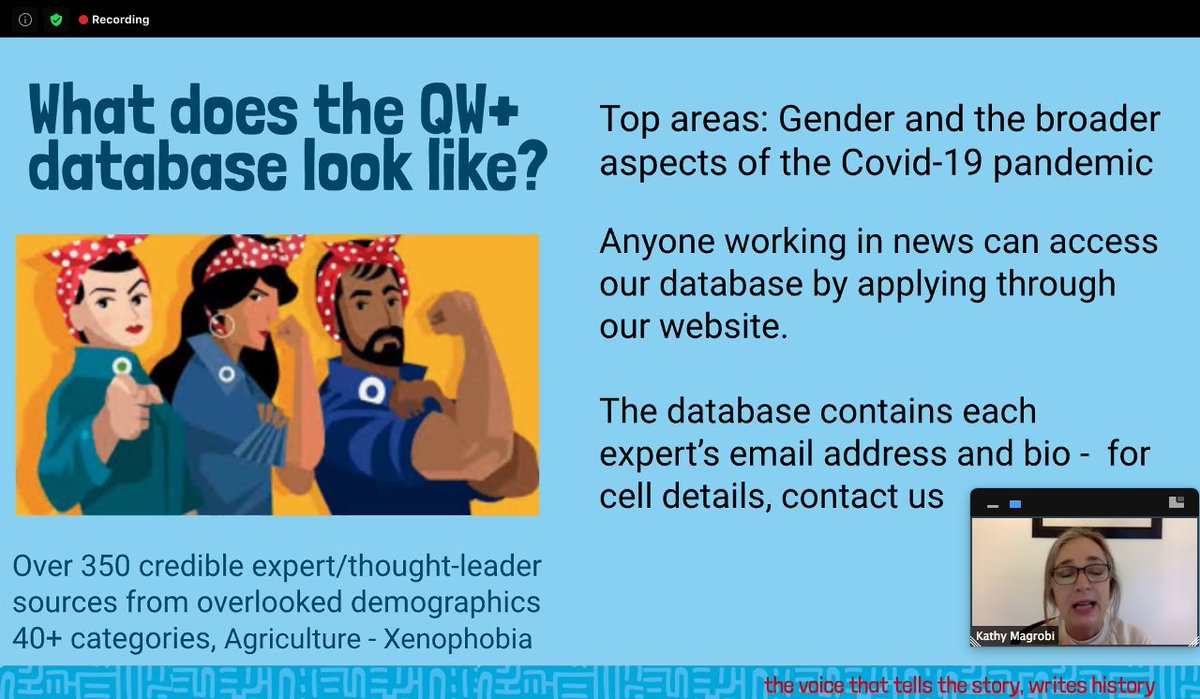
Namwezi: Now another threat we have to contend with is hackers and cyber attacks when trying to do our work. It is a new challenge which we are facing and don't know how to combat fully just yet #AIJC2020
Namwezi: Whether you cover politics or the economy, being a woman journalist in the #DRC is really difficult and it takes years to try to investigate certain stories #AIJC2020
Namwezi: Harassment and rape are the biggest threats faced by women working in an active war zone. Men don't have to think about their immediate safety at all times like us #AIJC2020
Investigative journalist @ArnaudOudraogo1 is up next and he'll be talking about the work being done in West Africa to support women working as investigative journalists #AIJC2020 

Oudraogo: The industry is still male-dominated and women in the newsroom often aren't entrusted or encouraged to tackle beats like politics. Many have to also take into account their husbands opinions before taking on certain stories #AIJC2020
Oudraogo: We have recruited 15 women journalists from Burkina Faso to train in the basics of data journalism to empower women to get involved in investigative stories #AIJC2020
.@ArnaudOudraogo1 says this project was an effort to begin changing the make-up of the industry and bridge the gap between journalists, civil society and key decision-makers in the country #AIJC2020
Participant, Barbara Amayo from Uganda joins in now and says as a woman journalist it has now become more dangerous to report on corporates than governments. She says this increases the dangers faced by journalists and their immediate families #AIJC2020
.@KathyMagrobi from @quotethiswoman is sharing her presentation now. Giving us examples of stories she looked up this week, to look into the number of women quoted as sources in each #AIJC 

"Less than 4% of all reporting actively challenges gender stereotypes and bias" - @KathyMagrobi
Things like graphics and photographs used act to enforce prevailing stereotypes #AIJC2020
Things like graphics and photographs used act to enforce prevailing stereotypes #AIJC2020
Magrobi: @quotethiswoman works to challenge this by putting together a database of women who can be used as expert sources in news stories. This database can help amplify the perspectives od women's lived experiences in coverage #AIJC2020
Magrobi: The database is free to access by journalists and is carefully organised to help them find the person they need quickly, while on deadline #AIJC2020 

.@KathyMagrobi: quoting women helps increase their agency in the fields they work in. We don't necessarily think women do news better, but do things and see things differently #AIJC2020
Q&A part of the session getting underway. The first question asked: "why do so few women enter the profession?"
@Namwezidouce says there are significant barriers brought on by one's gender but women should be pushed by their passion to make inroads in investigative journalism
@Namwezidouce says there are significant barriers brought on by one's gender but women should be pushed by their passion to make inroads in investigative journalism
Participant, Naijat Omar from Tanzania says in her experience as an investigative journalist, things are getting more difficult with legislation increasingly being used to restrict the work they are able to do #AIJC2020
Omar: We get calls threatening us not to go to stories before we even leave the newsroom. Our families are also threatened now. It's tough and a bit demoralising #AIJC2020
.@paulafray asks how should journalists get around colleagues who work against them in the newsroom, should we name and shame them?
@Namwezidouce says it should be on a case by case basis, especially because it is not always male colleagues discouraging you, sometimes it's women
@Namwezidouce says it should be on a case by case basis, especially because it is not always male colleagues discouraging you, sometimes it's women
@paulafray @Namwezidouce Final thoughts as we wrap up the session:
@KathyMagrobi: what gets measured, gets changed...so count who you quote and how often, it matters.
Thank you to @paulafray, @ArnaudOudraogo1 and @Namwezidouce for their contribution to this session.
@KathyMagrobi: what gets measured, gets changed...so count who you quote and how often, it matters.
Thank you to @paulafray, @ArnaudOudraogo1 and @Namwezidouce for their contribution to this session.
• • •
Missing some Tweet in this thread? You can try to
force a refresh










